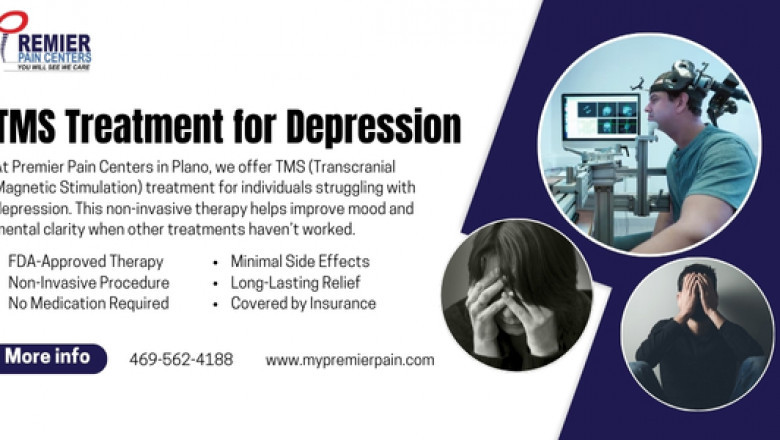views
TMS involves placing an electromagnet on the scalp near the forehead, above the prefrontal cortex. In depressed patients, this brain region has lower activity, but the electromagnetic field flows easily through the skull to excite it. TMS therapy in Dallas reduces depression and improves mental health by increasing brain activity. TMS is notably helpful for treatment-resistant depression, which has not responded to medications or psychotherapy. It gives depressed people hope for recovery without the systemic negative effects of drugs. TMS may be an option if other depression treatments have failed.
What's TMS?
TMS treats major depression. No surgery is needed for this noninvasive technique. Antidepressant-resistant patients can benefit from this FDA-approved medicine. TMS stimulates the prefrontal cortex with magnetic pulses. The cortex controls mood. Depression often reduces its activity. Reinstating activity in this region may alleviate TMS for depression in Dallas. TMS can also stimulate deeper brain regions. Deep TMS treats OCD. Prescriptions are needed for standard and deep TMS. Board-certified psychiatrists will oversee treatment.
Deep TMS for anxiety in Dallas is advised for the treatment of depressive episodes and anxiety symptoms in adult patients with major depressive disorder, particularly those with comorbid anxiety symptoms who have not adequately responded to antidepressant medication. Deep TMS may enhance the therapy of adult obsessive-compulsive disorder. Deep TMS is the sole FDA-cleared noninvasive medical technology with clinically validated results for this condition. Deep TMS facilitates short-term smoking cessation in adults.
TMS Treatment Benefits
TMS therapy has been shown to alleviate depression when other therapies fail. TMS regularly improves mood and function in clinical studies and patient comments. Treatment frequently reduces symptom severity by 50% after four weeks, with 75% of patients seeing results.
Advantages Over Other Treatments
Treatment using TMS is noninvasive. TMS sessions don't require anesthesia or induce memory loss like electroconvulsive therapy, which does. For energetic people, each 15–45-minute session lets you resume everyday activities right away. TMS therapy in Dallas is focused and avoids the systemic side effects of antidepressants, such as weight gain, weariness, and sexual dysfunction.
Benefits Over Time
TMS-responsive patients generally receive long-term alleviation. Over 60% of patients who react to this medication experience better mood and functioning for over a year. Most patients with recurrent symptoms respond well to repeat treatment. TMS transcends mere treatment; it enhances the quality of life, and fosters hope in individuals with depression. TMS may be a good option for reliable transformation without adverse effects.
Overview of TMS Treatment
Knowing what happens during a TMS session can reduce your anxiety. Each session entails sitting in a special chair while a psychiatrist or nurse applies an electromagnet to your scalp. The technology stimulates mood-regulating brain cells with targeted electromagnetic pulses.
Detailed Process Steps
-
Preparation: At the clinic, you'll sit in the treatment chair. The clinician will fit the electromagnet on your head and align it with the desired brain regions.
-
Sessions begin with 10 electromagnetic pulses per second from the equipment. Repetitive transcranial magnetic stimulation (rTMS) uses these pulses to activate the brain. The scalp will be tapped, and pulses will click throughout treatment. Some individuals have early soreness that normally settles within a week. These feelings are natural and reflect proper stimulation.
-
Monitoring: The technician tracks machine parameters and treatment reactions during the session. Adjustments can improve comfort and efficiency.
The average session lasts 15–30 minutes. For your comfort, the clinic provides TV, music, and relaxation. No recovery time is needed after the session. Driving and other regular activities can resume immediately.
Treatment Frequency and Duration
Monday through Friday sessions for 36 TMS treatments over 7 weeks are normal. Regular psychiatrist visits will track your progress and alter treatment.
Safety and Side Effects
TMS is safe and well-tolerated. While receiving treatment, transient pain is the most prevalent adverse effect. Other infrequent adverse effects include slight headaches or lightheadedness that usually go away after the session.
Ongoing Support and Evaluation
You will meet with your treatment team often to review your progress and concerns. This continuing assistance is essential to ensure treatment efficacy and make changes for the best results.
What are the Side Effects?
TMS is safe and has few negative effects. Fifty per cent of patients indicate headaches as the predominant side effect. TMS pulses may cause scalp pain or face twitching in one-third of patients. Treatment improves these, too. Coil positioning can be adjusted instantly to decrease discomfort. The TMS device clicks loudly. Earplugs are needed during treatment. There is no evidence that the use of earplugs during therapy causes permanent changes in hearing.
The primary risk associated with TMS is seizures. TMS presents a negligible risk of seizure.
Conclusion
A magnetic field influences brain electrical activity in transcranial magnetic stimulation (TMS). TMS therapy in Dallas treatment can help with depression, OCD, smoking cessation, and migraines. TMS, albeit not a first-line treatment, gives hope to those who haven't responded to previous treatments. TMS can save lives in severe or treatment-resistant depression. Experts are now investigating whether it can treat other brain-related diseases, expanding its uses.













Comments
0 comment